《TAIPEI TIMES 焦點》 US ex-officials see positive side

Stephen Yates, former deputy national security adviser to then-US vice president Dick Cheney, speaks in Washington on July 21. Photo: CNA
TSAI-TRUMP: Stephen Yates discussed the telephone chat in an interview with Voice of America, while former AIT director William Stanton spoke about it on a show in Taipei
/ Staff writer, with CNA
President Tsai Ing-wen’s (蔡英文) congratulatory telephone call to US president-elect Donald Trump on Friday has been described by two former US officials as a positive development in the ties between the two nations.
The call not only carried symbolic weight, but also had strategic significance for the incoming US administration regarding trade talks with Taiwan, said Stephen Yates, an expert on Asia who served as deputy national security adviser to former US vice president Dick Cheney.
In an interview on Sunday on Voice of America, Yates said he was certain that during the call, Trump addressed Tsai as president of Taiwan because she is Taiwan’s president, a reality that some people in the US and China deny.
Trump knows well how to separate the symbolic and the substantial meanings of the congratulatory call, said Yates, chairman of the Idaho Republican Party, who is scheduled to visit Taiwan this week to meet with business clients.
Yates said that Trump had issued a news release on the 10-minute phone conversation with Tsai and also tweeted about it, mentioning US arms sales to Taiwan.
One of the main speculations was whether Trump planned to break with the US’ “one China” policy, which was adopted in 1979 after Washington switched diplomatic recognition from Taipei to Beijing.
Yates said that Trump’s tweets indicate that he probably placed more value on the strategic importance of the call with regard to US arms exports than on symbolic issues and criticisms of the call.
Taiwanese could sense Trump’s happiness and pleasure at receiving the call from their president, but they should remember that Trump loves the US and that US interests will be his top priority, Yates said.
Trump’s aims include selling more arms to Taiwan to deter China’s military threats and negotiating trade deals with Taiwan, he said.
Trump’s Taiwan policy might prove a political challenge to Taiwan’s government and an even bigger one to Chinese leaders, Yates said.
If China is infuriated about the call and sees it as a strategic threat by the US or Taiwan, that is Beijing’s problem, Yates said.
He suggested that China follow Trump’s example and show respect for Taiwan’s democratization and political reforms.
Former American Institute in Taiwan (AIT) director William Stanton yesterday said in a radio newscast in Taipei that he thought the call was a positive development in Taiwan-US relations.
Stanton said he thought the call was prearranged and he expressed the view that Washington should have made such a move earlier.
Commenting on a White House statement issued after the call, Stanton said he did not agree with the administration’s response that it remained “firmly committed” to its “one China” policy.
“One China” should not be overly simplified because the US and China each have different interpretations of the policy, and the US has never said that China has sovereignty over Taiwan, he said.
新聞來源:TAIPEI TIMES




















